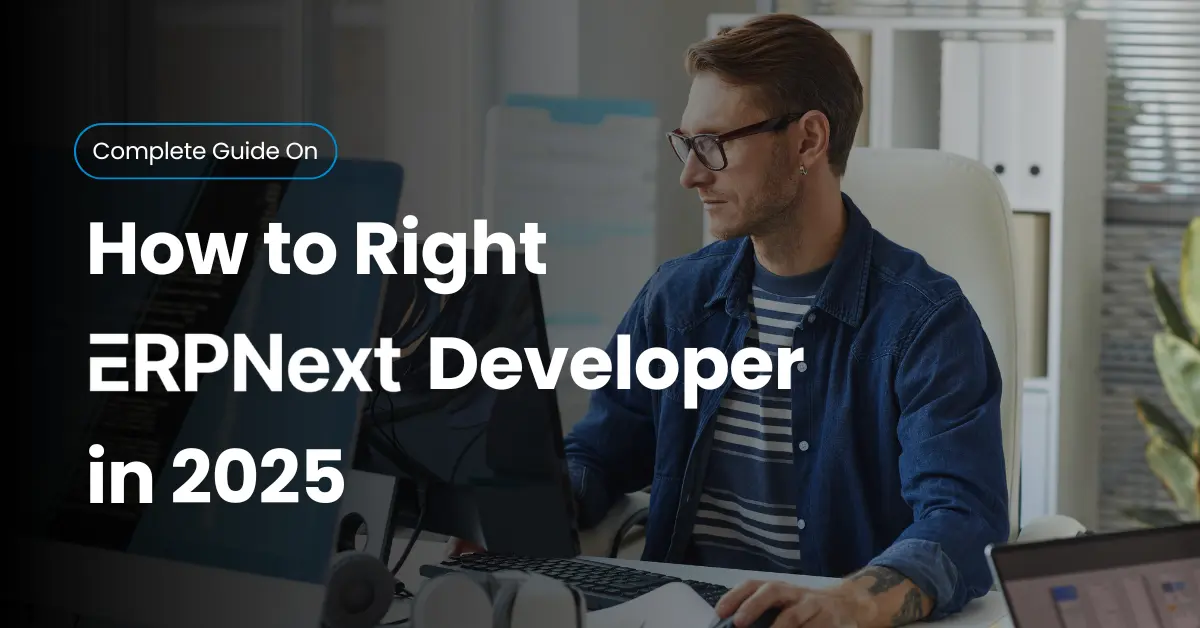If you’re looking to hire an ERPNext developer in 2025, you’ve probably realized it’s not as simple as posting a job ad and hoping the right candidate shows up. ERPNext has matured a lot in the last few years, and the skills needed today aren’t the same as they were back in 2020.
The right developer isn’t just someone who can code. They need to understand ERPNext developer roles, keep up with ERPNext framework 2025 updates, and be savvy with industry-specific requirements. A poor hire can cost months of wasted time and thousands of dollars in rework. A smart hire can save you both.

What’s New in ERPNext & Frappe in 2025 — Why Specialist Experience Matters
ERPNext has evolved with Version 16, and that means big changes in usability and performance. From streamlined workflows to faster reporting, companies are upgrading to stay competitive. If your developer isn’t current, you risk missing out on key advantages.
That’s where Frappe framework experience comes in. The 2025 updates include ERPNext version 16 features, performance improvements, and Frappe Cloud updates that make systems more scalable. Hiring someone who’s actually implemented these changes before is critical.
If you’re unsure where to start, you can always Hire Infintrix ERPNext Developer for tailored solutions that match your business needs.
- ERPNext new modules like advanced supply chain and AI-driven analytics are now live.
- Security patches and compliance updates require skilled handling.
- Companies upgrading from v15 to v16 are reporting smoother processes and faster reporting speeds.
📌 Pro Tip: Ask your candidate if they’ve worked on a version upgrade in ERPNext within the last 12 months. If not, keep looking.
Define Your Project Scope: Don’t Underestimate the Preparation
Before you even think about hiring, you need clarity on what your ERPNext project actually involves. This step can save you from surprise costs and endless scope creep later. Define your modules, integrations, and deployment approach up front.
Think about it: your ERPNext implementation cost 2025 could double if you underestimate. By documenting your goals and needs early, you’ll also attract developers who have the right ERPNext customization skills instead of generalists who’ll struggle.
What Modules & Features You Really Need
ERPNext offers a buffet of features, but you don’t need everything on day one. Focus on ERPNext modules (Accounting, HR, Inventory, CRM, Projects, Manufacturing, etc.) that are essential to your business. Add advanced features only when they drive measurable value.
Integration, Data & Users: The Hidden Complexity
Don’t ignore integration & APIs in ERPNext, data migration, and role-based access. These areas eat up more time and budget than you expect. Whether it’s syncing with a payment gateway or handling thousands of users, the complexity here is often what makes projects expensive.
Deployment, Remote Access & Field Use Cases
How will your team use ERPNext? If you’ve got mobile staff or need mobile/offline capabilities in ERPNext, that changes the game. Decisions about on-premise vs. cloud deployment also affect which developer you’ll need. Not every hire is comfortable with hybrid or remote-first rollouts.
What Skills & Experience Should Your ERPNext Developer Bring

Not all developers are created equal. To get real ROI, you need someone who combines ERPNext customization skills with a deep knowledge of the Frappe framework. That means they’re strong in Python, understand integration & APIs in ERPNext, and know how to manage data migration in ERPNext.
Equally important? Soft skills. Your project will involve back-and-forth discussions, shifting needs, and maybe even a bit of firefighting. Developers with solid communication and adaptability are worth their weight in gold.
Core Technical Skills: The Must-Haves
At a minimum, your developer should know Python, JavaScript, MariaDB, and Git. They must also have hands-on Frappe framework experience, version control, and security best practices. If they don’t understand workflow automation in ERPNext, they’ll struggle to deliver beyond the basics.
Domain & Localization Experience
Hiring someone who knows your industry—be it healthcare, manufacturing, or retail—is a bonus. They’ll already understand workflows and compliance. Add localization expertise (like tax and regulatory rules), and you’ll cut implementation time in half.
Soft Skills, Communication & Project Management
Here’s the thing: soft skills for ERPNext developers matter. Strong communication, problem solving, and documentation practices keep projects moving. If a developer can’t explain a feature in plain English, you’ll run into headaches down the line.
Differentiators that Move the Needle
How do you separate good from great? Look for open-source contributions, a track record with version upgrades in ERPNext, and proven ability with scaling projects. Developers who’ve handled performance & scalability in ERPNext for growing companies are often the safest long-term bet.
Note:
~ Experienced teams like Infintrix bring proven ERPNext customization skills and deep Frappe framework experience—making them a safe choice if you need end-to-end support
Where & How to Find the Right ERPNext Developer / Team
There are a few solid paths when you want to hire an ERPNext developer. You can go freelance, bring in an agency, or even hire in-house. Each option has trade-offs in cost, flexibility, and accountability.
Freelance marketplaces like Upwork or Arc are popular if you need speed and lower costs. Agencies or ERPNext partner firms make more sense for bigger, long-term projects where you need reliability and depth.
- Freelancers: Quick, flexible, lower cost. Risk = availability.
- Agencies: Full team support, project management. Risk = higher fees.
- In-house: Dedicated focus, domain knowledge. Risk = higher salary overhead.
- Solution:Freelancers are great for quick tasks, agencies provide structure, and with partners like Infintrix, you get a balance of flexibility and expertise. Many clients prefer to Hire Infintrix ERPNext Developer for scalable projects.
📌 Quick Tip: If you’re unsure, start with a short project (like a module setup) before committing to a full-time hire.
Local vs Remote ERPNext Hiring Trade-Offs
Hiring locally can feel easier—you share time zones and can meet in person. But it’s often pricier. Remote hiring opens up access to global talent with lower ERPNext developer rates, though you’ll need stronger communication practices. Think about your team’s style before deciding.
Hourly vs Full-Time ERPNext Hiring
One major decision is whether to go hourly or bring someone on full-time. Hourly vs full-time ERPNext hiring boils down to project size. If you just need setup or a module customized, hourly freelancers are fine. For ongoing support and ERPNext customization skills, full-time (or agency retainers) are better.
ERPNext Developer Job Description Template
Writing a clear job description saves you from a flood of unqualified applicants. Spell out your required Frappe framework experience, modules to be customized, and expectations around communication. Adding a simple skills checklist can cut your hiring process in half.
Cost & Budgeting: What to Expect & Plan For
When it comes to money, transparency matters. The truth is, ERPNext implementation cost 2025 varies wildly depending on project complexity. Small projects might cost just a few thousand, while enterprise rollouts can cross six figures.
Your budget needs to factor in not only ERPNext developer rates but also ongoing ERPNext support & maintenance costs, hosting, and future upgrades. Think beyond the initial launch—ERP is a marathon, not a sprint.
Cost Drivers: What Makes Projects More Expensive
Projects balloon in cost due to customizations, complex integrations, or large-scale data migration in ERPNext. The number of users, security requirements, and whether you’re deploying on-premise or cloud also play huge roles. The more moving parts, the higher the bill.
Hosting & Infrastructure Options
Your choice of hosting can change both your costs and your developer needs. Managed cloud (like Frappe Cloud) simplifies setup but has recurring fees. Self-hosting gives more control but demands stronger Frappe framework experience from your hire. On-premise or hybrid setups are the priciest in the long run.
Ongoing Costs: Maintenance, Upgrades & Support
Don’t forget post-launch costs. You’ll need regular version upgrades in ERPNext, bug fixes, and security patches. Many companies budget for an ERPNext support & maintenance cost retainer—often 15–20% of the original project price—to avoid unpleasant surprises.
ERPNext Developer Rates Comparison
Here’s a quick look at what you can expect to pay across hiring models in 2025:
| Hiring Model | Typical ERPNext Developer Rates | Best For | Risk Level |
| Freelance (Upwork, Arc) | $25–$60/hr | Short-term projects, small businesses | Medium |
| Agency (ERPNext partner) | $75–$120/hr | Enterprise rollouts, ongoing support | Low |
| In-house Hire (USA) | $90k–$120k/yr | Dedicated projects, complex customizations | Low-Medium |
| Infintrix Technologies | $25-$35/hr | Dedicated projects, ongoing support, | Low |
Takeaway: Match the model to your project scope. If you’re unsure, pilot with a freelancer before scaling to an agency or full-time hire.
Interview & Evaluation Checklist: How to Vet Candidates Efficiently
Interviews aren’t just about asking “Can you code?” They’re about finding the right mix of ERPNext customization skills, communication, and reliability. A clear process helps you filter fast and avoid costly mis-hires.
Start by reviewing portfolios. Look for actual ERPNext modules (Accounting, HR, Inventory, CRM, etc.) they’ve delivered. Then move into a small ERPNext coding test or task to confirm technical ability before committing.
- Review GitHub or open-source contributions.
- Ask scenario-based ERPNext interview questions (e.g., “How would you handle workflow automation in ERPNext?”).
- Check references from past clients.
- Discuss communication cadence in dev projects—daily updates, weekly reports, etc.
Quick Tip: A candidate who can clearly explain integrations or data migration in ERPNext without jargon is a keeper.
Contracting, Support & Long-Term Maintenance: Setting Up for Success
Hiring doesn’t end when the developer signs on. Contracts, SLAs, and support agreements set the foundation for a smooth long-term relationship. Neglect this, and you’ll risk gaps when things go wrong.
Spell out expectations around ERPNext SLA, upgrade timelines, and security & compliance in ERPNext. This ensures the developer stays accountable not just for coding, but also for maintaining system health.
Version Upgrades in ERPNext
Every year, new versions bring features, bug fixes, and compliance changes. If your contract doesn’t cover version upgrades in ERPNext, you’ll either scramble for help later or end up stuck on outdated software. Future-proof by making upgrades part of the deal.
Security & Compliance in ERPNext
Security obligations often get ignored in ERP contracts. Don’t let that happen. Your developer should follow security best practices and ensure compliance with U.S. tax and data laws. Make it explicit in your contract for ERP developer that they’ll handle patches and audits.
Knowledge Transfer & Documentation
When the project wraps up, you’ll need clean documentation. Without it, future developers—or even your own staff—will struggle. A solid knowledge transfer ERPNext plan should include admin guides, code comments, and a walkthrough session.
Best Practices & Pro Tips to Avoid Costly Mistakes
ERP projects often fail not because the software is bad, but because of poor planning and rushed hiring. To avoid expensive pitfalls, stay disciplined with scope, communication, and rollouts.
Here are a few lessons from real-world implementations:
- Avoid scope creep in ERPNext. Lock down must-have features first, then add extras later.
- Plan data migration in ERPNext carefully—it often takes longer than expected.
- Roll out modules in phases instead of all at once.
- Track KPIs for ERP success like adoption rate, reporting speed, and downtime.
📌 Pro Tip: Small wins (like implementing Accounting first) build momentum and keep teams engaged. Jumping into full-scale deployment too fast is the #1 reason ERP rollouts flop.
FAQs — Answers to Common Questions (Schema-Friendly Section)
What is the difference between ERPNext Community and Enterprise editions?
Community is free and open-source. Enterprise adds managed hosting, extra support, and advanced features for larger organizations.
How much does it cost to hire a freelance ERPNext developer vs. working with an agency?
Freelancers on platforms like Upwork charge $25–$60/hr. Agencies often charge $75–$120/hr but include project management and a full team.
Which technical skills are essential vs nice-to-have in an ERPNext developer?
Essential: Python, Frappe framework experience, Git, database knowledge, and ERPNext customization skills. Nice-to-have: workflow automation, localization, and advanced reporting.
How long does an ERPNext implementation project usually take (small, medium, large)?
Small projects: 2–4 weeks. Medium rollouts: 2–3 months. Large enterprise builds can take 6–12 months.
What are the ongoing costs after go-live: maintenance, updates, support?
Plan for 15–20% of your initial cost annually. This covers bug fixes, ERPNext support & maintenance costs, and version upgrades.
How can I ensure the ERPNext developer I hire stays aligned with future upgrades and version changes?
Include upgrade commitments in the contract, and ask about their experience with version upgrades in ERPNext. Developers active in the open-source community are often most up-to-date.
Make the Right Hire, Avoid Regrets:
Hiring the right ERPNext developer in 2025 isn’t just about saving money—it’s about setting up your business for long-term efficiency and growth. If you choose well, you’ll get smooth workflows, accurate reporting, and a system that scales with you. If you choose poorly, you’ll face delays, ballooning costs, and frustrated teams.
The key is preparation: define your scope, know your budget, and vet candidates with both technical and soft skills in mind. Whether you go freelance, agency, or in-house, match the hire to your project size and complexity.
Making the right hire can save you months of frustration. If you want a trusted partner, you can confidently Hire Infintrix ERPNext Developer and set your project up for long-term success.
Quick Checklist for Hiring an ERPNext Developer
- Define required ERPNext modules (Accounting, HR, Inventory, etc.).
- Clarify integrations, data migration in ERPNext, and hosting choice.
- Look for Frappe framework experience + proven ERPNext customization skills.
- Compare ERPNext developer rates across freelance, agency, and in-house models.
- Lock in contracts that cover version upgrades in ERPNext and support.
- Watch out for scope creep ERPNext—start lean, then scale.
👉 Bottom line: plan carefully, vet thoroughly, and you’ll hire not just a coder, but a long-term partner for your ERP journey.

